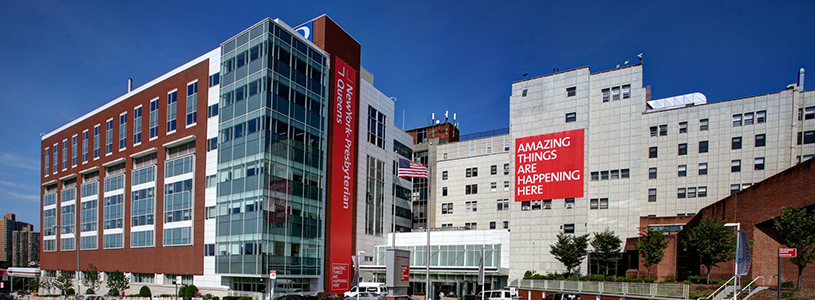10 Common Myths About Childhood Epilepsy Debunked
During National Epilepsy Awareness Month, NewYork-Presbyterian Queens shares facts about pediatric epilepsy and encourages children with seizures to live a full life.
Nov 2, 2021
Queens, New York

It is estimated that nearly 3.4 million Americans are currently diagnosed with epilepsy; 470,000 are children ages 14 and younger. The disease is identified by recurring seizures caused by a sudden surge of electrical disturbances in the brain. In recognition of National Epilepsy Awareness Month in November, NewYork-Presbyterian is dispelling common myths about the disease. These misconceptions can lead to discrimination and social isolation for the thousands of children who are living with seizures.
“Epilepsy is one of the oldest and most common brain disorders, affecting people of any age, ethnicity, or socioeconomic status, and yet many people do not understand the disease.” shared Dr. Jules Beal, a pediatric neurologist specializing in epilepsy at NewYork-Presbyterian Queens and an assistant professor of clinical pediatrics at Weill Cornell Medicine.
“Parents with a newly diagnosed child may wonder, can my child ever play sports, ride a bike or learn to swim?” Dr. Beal said, “The answer is yes, and the good news is many children will outgrow the disease with time, and children can often live a normal life with adequate medical treatment and healthy lifestyle habits.”
Dr. Beal encourages families and the community to know the facts about epilepsy to combat stigma and fear. He offers answers for these common myths:
- All seizures are violent and intense, with convulsions and loss of consciousness.
There are dozens of different types of seizures. Seizures can vary in severity, frequency, and duration. Not all seizures involve shaking; during a seizure a child may have a staring spell, seem confused, or may have trouble speaking. - A child can swallow their tongue during a seizure, so it is best to put an object into their mouth to prevent this.
It is physically impossible to swallow your tongue! You should never force an object into a child’s mouth during a seizure, as doing so could chip teeth or hurt their gums and jaw. I recommend gently rolling the child on one side and putting something soft under their head. - You should restrain a child who is having a seizure.
It is not necessary to use restraint or force when a child has a seizure. Usually, the seizure will run its course in a few minutes. - A child must go to the hospital if they have a seizure.
Only the most severe seizures require hospitalization. Usually, the child will need time to rest and recover after their seizure. However, if you see any signs of medical distress or if the seizure lasts more than 5 minutes, call 911. And of course, if you feel uncomfortable with the situation, seeking medical help is never wrong. - If a parent has epilepsy, their child will more than likely have the disease.
There are many different kinds of epilepsy, some of which tend to run in families and some of which do not. There are many cases of epilepsy with no family history. Sometimes children of a parent with epilepsy will have seizures, but the risk of parents passing epilepsy on to their children is usually relatively low. - Children with epilepsy are mentally ill or developmentally disabled.
Epilepsy is a neurological disorder defined by the presence of seizures. Children with the disease are not necessarily mentally ill, developmentally disabled, or intellectually impaired. In fact many patients with epilepsy live normal lives. - Children with epilepsy should not play sports.
In most cases, epilepsy is not a barrier to physical achievement. Children and teens with epilepsy can participate in group and competitive sports. However, if a child has frequent or severe seizures, there may be a greater need for that child to modify athletic activities. Activities that involve climbing are not recommended, and care must be taken with activities around water. - You cannot obtain a driver’s license or drive if you have epilepsy.
People with uncontrolled severe seizures or newly diagnosed epilepsy may initially be unable to drive. In many states, if epilepsy is well controlled and the person is seizure-free for a specific period of time, they may resume driving. - Epilepsy is contagious.
Epilepsy is not an infectious disease like a cold or the flu. It is not possible to “catch” the disease from another person. - Epilepsy is very rare.
Epilepsy is the fourth most common neurological disorder and affects people of all ages. More people live with epilepsy than with autism spectrum disorders, Parkinson's disease, multiple sclerosis and cerebral palsy – combined.
An epilepsy diagnosis can be an overwhelming and scary time in a family’s life. However with education, support and the appropriate medical interventions, parents can ensure that their child has a happy and fulfilling life.
Pediatric Epilepsy Services at NewYork-Presbyterian Queens
The pediatric epilepsy program at NewYork-Presbyterian Queens provides a comprehensive assessment, thorough evaluation and treatment plan to support children with epilepsy. We are the only hospital in Queens with an inpatient pediatric video EEG program to help identify the location, type, and severity of seizures.
For more information on our pediatric epilepsy program and more details on treating epilepsy, please visit https://www.nyp.org/queens/pediatrics/pediatric-neurology
Media Contact:
Office of Communications [email protected]


